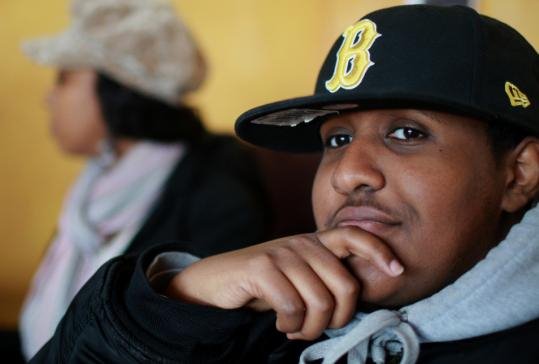Terror
allegations rile Boston's Somali immigrants
(Boston.
March 13, 2009 Ceegaag Online)

Sixteen-year-old Farah Musa said recruitment of Somali youth
as terrorists could not happen in the Hub: ''That's not
Boston. That's not my city.'' (Jonathan Wiggs/Globe Staff)
The social hub for Somali
immigrants is a little coffee shop wedged between a T
station and the transit police at Roxbury Crossing. Everyone
seems to know everyone else's name, where they work, and
where their children work. "Cousin!" the owner greets
customers, whether they are related or not.
Yesterday, the tight circle at Butterfly Coffee was
shaken by assertions before a Senate panel Wednesday that a
radical Islamic group linked to Al Qaeda might be recruiting
youths in Boston to fight in Somalia. Immigrants said they
are worried about such recruitment nationwide, but they were
angered that a Somali leader from another state had put
Boston's com munity in a harsh national spotlight without
providing hard evidence.
"In Boston? It's impossible," said Abraham Ahmad, a
realtor and Somali immigrant who sat with a group of men for
his morning coffee. "We would report it as soon as
possible."
Concern over recruitment has intensified in recent
months, particularly in Minnesota, where several young men
have disappeared and where one man is believed to be the
first Somali-born US citizen to become a suicide bomber,
after he blew himself up in Somalia in October.
On Wednesday, top US law enforcement and intelligence
officials told the Senate Committee on Homeland Security
that a small number of Somali-Americans from several US
cities have traveled to Somalia since 2006 to fight with Al-Shabaab,
which was declared a terrorist organization by the State
Department last year.
Officials do not believe it is widespread among the more
than 150,000 Somali-Americans, including 5,000 in
Massachusetts, but said it is troubling because insurgents
could be trained and return to engage in terrorist
activities in the United States.
A Somali leader from another state, Osman Ahmed, told the
committee that task forces to reach out to Somalis should be
set up in Minneapolis, Seattle, Columbus, Ohio, and Boston
to prevent such recruitment. Yesterday, he said he launched
a nationwide investigation last fall, after his own nephew
left for Somalia, possibly to be with Al-Shabaab, and was
told by friends that two youths had also disappeared in
Boston.
Ahmed urged Boston-area families to come forward if their
children are missing. "We need to work together," he said.
For some Somali-Americans, the Senate testimony
resurrected memories about the fear and rejection many of
them faced after they arrived in New England.
In 2002, the Holyoke City Council voted to oppose a plan
to resettle Somali refugees there, contending the city could
not afford the burden on schools and other services. That
same year, the mayor of Lewiston, Maine, urged Somali
refugees to stop coming to his city because he said they
were a drain on services.
But in recent years, like other immigrant groups, Somalis
have learned English, gone to college, become business
owners and bankers, as well as parking garage attendants and
taxi drivers. In Boston, they are increasingly US citizens
who are concerned as much with homeownership, getting into
public office, and jury duty as with their families back
home.
They even hire native-born Americans, one customer
pointed out, noting that all the counter help in the
Somali-owned Butterfly Coffee are white college students who
take orders from non-English speaking immigrants using
makeshift sign language.
Two months ago, local Somali leaders promised the FBI at
a meeting in the Muslim community's new mosque across the
street from the coffee shop that they would watch for any
signs that radicals were recruiting local youths, but knew
of no such activity.
"The FBI told us to watch out," 63-year-old Hassan Dahir,
a father of six, all of whom went to college, said through a
translator yesterday. "We all told the kids you just have to
be a good citizen. . . . They don't want to be in a war."
Yesterday, a group of elders at Butterfly Coffee cornered
a Somali teenager, Farah Musa, who dropped by after class
ended at English High School. He was born in a Kenyan
refugee camp and raised in America.
He said he had not heard of any recruitment.
"That's not Boston," said Musa, 16, shaking his head
under a Bruins cap. "That's not my city."
For Somali immigrants, much is at stake in America. Their
good standing is literally helping them save lives back
home: Immigrants send up to $1 billion a year home in
remittances - including from a kiosk inside Butterfly Coffee
- to a Horn of Africa nation wracked by war and vast
unemployment.
The money is used to treat malaria, feed dozens of
friends and relatives, and put roofs over grandparents'
heads.
"If I wasn't here, there's no life in Somalia," said
Abdillahi Abdirahman, the coffee shop owner.
Like the others, he is worried about what Al-Shabaab's
recruiting efforts could do to his Somali-American
communities, whether they are in Boston or not.
"One bad apple [in Massachusetts] could destroy the whole
thing that we've built," he said.
Source: Boston Globe
www.ceegaag.com

webmaster@ceegaag.com |

